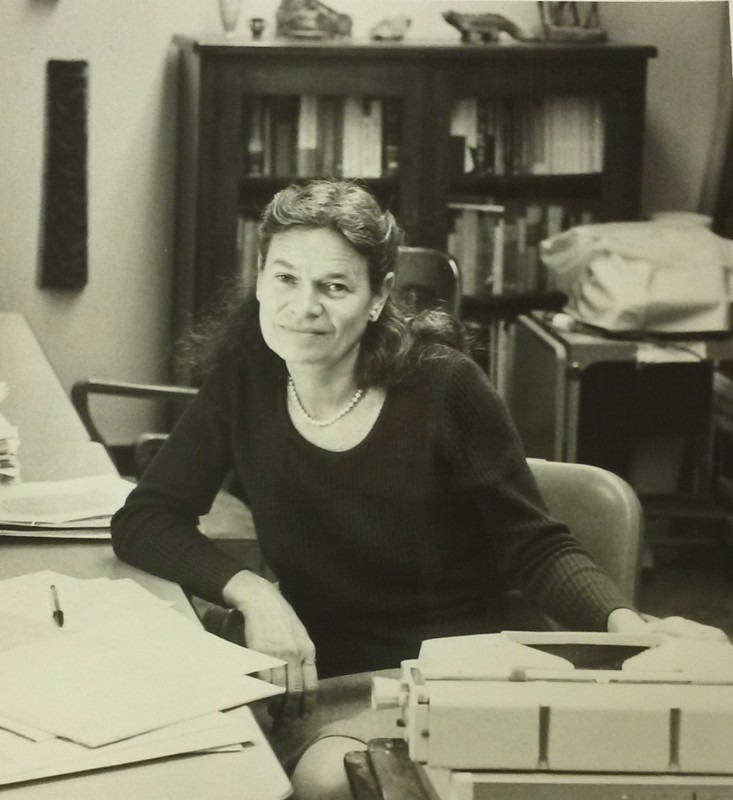
エレノア・リーコック
Eleanor Leacock, 1922-1987
☆
エレノア・バーク・リーコック(1922年7月2日 -
1987年4月2日)は、アメリカの人類学者、社会理論家であり、平等主義的社会、社会における女性の地位の進化、マルクス主義、フェミニスト運動の研究
に多大な貢献をした。
| Eleanor Burke
Leacock (July 2, 1922 – April 2, 1987) was an American
anthropologist and social theorist who made major contributions to the
study of egalitarian societies, the evolution of the status of women in
society, Marxism, and the feminist movement. |
エレノア・バーク・リーコック(1922年7月2日 -
1987年4月2日)は、アメリカの人類学者、社会理論家であり、平等主義的社会、社会における女性の地位の進化、マルクス主義、フェミニスト運動の研究
に多大な貢献をした。 |
| Early life and education Leacock was born on July 2, 1922, in Weehawken, New Jersey, the second of three daughters.[1] Her mother, Lily Mary Battherham, was a mathematician who taught secondary school and her father was the literary critic and philosopher Kenneth Burke.[2] Leacock was raised between the family's apartment in Greenwich Village, New York and their northern New Jersey 150-acre farm, living half of the year in each place.[3] Living in a social circle that included artists, political radicals and intellectuals prompted into Leacock an ideal "to be scornful of materialist consumerism; to value—even revere—nature; to hate deeply the injustices of exploitation and racial discrimination...and to be committed to the importance of doing what one could to bring about a socialist transformation of society".[4] Leacock attended New York public schools during her childhood until her teenage years, when she got a scholarship to the prestigious private high school Dalton School.[2] Also on scholarship, she started undergraduate courses in anthropology at Radcliffe College in 1939.[1] At Radcliffe, she was introduced by Carleton S. Coon to the neo-evolutionary thought of V. Gordon Childe and C. Daryll Forde.[4] She also became involved in studying Lewis H. Morgan and Karl Marx and in radical student politics.[4] There she also met filmmaker Richard Leacock, whom she married in 1941.[1] After curfew violations, Radcliffe authorities asked her to leave and she transferred to Barnard College in 1942.[1] She studied under Gladys Reichard,[5] graduating from Barnard in 1944 with a Bachelor of Arts degree in anthropology.[2] |
幼少期と教育 リーコックは1922年7月2日、ニュージャージー州ウィーホーケンで3人姉妹の次女として生まれた。[1] 母親のリリー・メアリー・バザーハムは中等学校で数学を教える数学者であり、父親は文学評論家で哲学者のケネス・バークであった。[2] リーコックは、ニューヨークのグリニッジ・ビレッジにある家族のアパートとニュージャージー州北部にある150エーカーの農場を行き来しながら育った。農 場、そして1年の半分をそれぞれの場所で過ごした。[3] 芸術家、急進的政治家、知識人などが集う社交界に身を置くことで、リーコックは「唯物的な消費主義を軽蔑し、自然を尊重し、畏敬の念を抱き、搾取や人種差 別などの不正義を深く憎み、社会の社会主義的変革のためにできることを行うことの重要性を信じる」という理想を抱くようになった。[4] リーコックは、10代になるまでの幼少期をニューヨークの公立学校で過ごし、その後、名門私立高校であるダルトン・スクールに奨学金を得て進学した。 [2] 同じく奨学金を得て、1939年にラドクリフ・カレッジで人類学の学部課程を始めた。[1] ラドクリフでは、カールトン・S・クーンから、V. ゴードン・チャイルドとC. ダリル・フォードの新進化論思想を紹介された。[4] また、 ルイス・H・モーガンとカール・マルクスの研究や急進的な学生政治にも関わるようになった。[4] また、そこで映画監督のリチャード・リーコックと出会い、1941年に結婚した。[1] 外出禁止令違反により、ラドクリフ大学の当局から退学を命じられ、1942年にバーナード・カレッジに転校した。[1] グラディス・ライヒャードの指導を受け、[5] 1944年にバーナード・カレッジを人類学の学士号を取得して卒業した。[2] |
| Academic career After receiving her graduate degree, Leacock traveled to Europe with her first husband while he was shooting films on human geography. It is during this time in Paris that she began researching the social changes in the fur trade amount the Montagnais-Naskapi people. In 1951 Leacock received a grant to conduct fieldwork in Labrador, Canada. During this time she brought her one-year-old son with her to Labrador. She used this fieldwork to challenge the idea that private property is universal.[6] She worked at Bank Street College of Education as a senior research associate, from 1958 to 1965,[7] and at Polytechnic Institute of Brooklyn in the social sciences department, from 1963 to 1972.[7] She struggled to get a full-time job during the 1950s due to her outspoken political views.[8] She taught as an adjunct for decades before being appointed, in 1972, as a professor and chair of anthropology at City College (CCNY) and graduate faculty of City University of New York Graduate Center.[5][9] Although highly qualified, Leacock credited her CCNY appointment to the rise of the women's movement and social pressure felt by City College to diversify its faculty.[10] Her appointment coincided with the publication of her celebrated introduction to Friedrich Engels' The Origins of the Family, Private Property and the State. In that introduction, she cited contemporary research to further explicate Engels' theory that "the historic defeat of the female sex" and subjugation of women began with the stratification of society, the widespread practice of private property, and the emergence of a state. It is not until 1971 that she does her next big fieldwork assignment in Zambia. During this time Zambia had not let many anthropologists into the country because of perceived colonist attitudes. This particular fieldwork aided Leacock in her research of the decolonization efforts in primary school education.[6] One of Leacock's most fruitful contributions to the field of anthropology was her essay entitled "Interpreting the Origins of Gender Inequality: Conceptual and Historical Problems" (1983), in which she discussed gender inequalities. Leacock's theories mainly concentrated on the relationships between race, class, gender, sexuality, and religion. And she refuted biological determinism as it relates to race, gender, and class. Leacock's work could be reflected in five areas: women's status in egalitarian societies, race, and gender in schools, culture of poverty studies, women's work in development, and the studies of race, class, and gender in Samoa. Arguing the roles of women in the hierarchical society, she claimed that some features of women become exploitable under the patriarchy system. Leacock interpreted the structure of marriage as the structure of exchange and the division of labor. The exploitation of women's labor within the household is the same. Leacock's career involved four major regions: North America, Europe, Africa, and the Pacific. In these areas she studied various topics including the anthropology of education, women cross-culturally, foraging societies, etc.[9] Leacock died of a stroke on April 2, 1987, in Hawaii. |
学術的な経歴 大学院の学位を取得後、リーコックは最初の夫とともにヨーロッパを訪れた。夫は人間地理学に関する映画の撮影中であった。彼女がモンタニャック=ナスカピ 族の毛皮貿易における社会変化の研究を始めたのは、このパリ滞在中であった。1951年、リーコックはカナダのラブラドールでフィールドワークを行うため の助成金を受けた。このとき、彼女は1歳になる息子を連れてラブラドールに向かった。彼女は、私有財産は普遍的なものであるという考えに異議を唱えるため に、このフィールドワークを利用した。[6] 彼女は1958年から1965年までバンク・ストリート教育大学で上級研究員として、また1963年から1972年までブルックリン工科大学の社会科学部 で教鞭をとった。[7] 彼女は1950年代には、政治的な意見を率直に述べていたため、フルタイムの職を得るのに苦労した。[8] 彼女は何十年もの間非常勤講師として教鞭をとった後、1972年に 1972年にシティカレッジ(CCNY)およびニューヨーク市立大学大学院センターの教授および人類学部長に任命された。[5][9] 非常に有能であったにもかかわらず、リーコックは、CCNYへの任命は、女性運動の高まりと、教職員の多様化を求めるシティカレッジの社会的圧力によるも のだと考えている。[10] 彼女の任命は、フリードリヒ・エンゲルスの『家族・私有財産・国家の起源』の著名な序文の出版と時を同じくしていた。その序文で彼女は、現代の研究を引用 し、女性の歴史的な敗北と女性の従属は、社会の階層化、私有財産の広範な実践、国家の出現とともに始まったというエンゲルスの理論をさらに明確に説明し た。 彼女が次に大きなフィールドワークの任務をザンビアで遂行するのは、1971年になってからである。この間、ザンビアは植民地主義的な態度をとっていると 見なされていたため、多くの人類学者を国内に入れなかった。この特定のフィールドワークは、小学校教育における脱植民地化の取り組みに関するレオコックの 研究に役立った。[6] 人類学の分野におけるレオコックの最も重要な貢献のひとつは、ジェンダーの不平等について論じた「ジェンダーの不平等性の起源の解釈:概念的および歴史的 問題」(1983年)と題された彼女の論文である。レオコックの理論は主に、人種、階級、ジェンダー、セクシュアリティ、宗教の関係に焦点を当てたもので あった。そして、人種、ジェンダー、階級に関連する生物学的決定論を否定した。リーコックの研究は、平等主義社会における女性の地位、学校における人種と ジェンダー、貧困文化研究、開発における女性の労働、サモアにおける人種、階級、ジェンダーの研究という5つの分野に反映されている。 階層社会における女性の役割について論じ、彼女は家父長制システムの下では女性のいくつかの特徴が搾取の対象となりうると主張した。 リーコックは結婚の構造を交換と労働の分業の構造と解釈した。家庭内における女性の労働搾取も同様である。 リーコックの研究対象は、北米、ヨーロッパ、アフリカ、太平洋の4つの主要地域にわたった。これらの地域で、彼女は教育人類学、異文化における女性、採集 社会など、さまざまなテーマを研究した。 リーコックは1987年4月2日、ハワイで脳卒中に倒れ、死去した。 |
| Works and publications dissertation, The Montagnais "Hunting Territory" and the Fur Trade (American Anthropological Association (Memoir 78))[7] Teaching and Learning in City Schools: A Comparative Study (NY: Basic Books, 1969)[7] editor, A Culture of Poverty: Critique (NY: Simon & Schuster, 1971)[7] Myths of Male Dominance (NY: Monthly Review Press, 1981) editor, then-recent edition, Morgan, Ancient Society editor, then-recent edition, Engels, Origin of the Family, Private Property and the State[7] editor with Nancy Lurie, North American Indians in Historical Perspective (NY: Random House, 1971)[7] author, essay, "Women's Status in Egalitarian Society: Implications for Social Evolution", Current Anthropology (1978, volume 19, issue 2)[7] |
作品および出版物 論文、モンタナ族の「狩猟地域」と毛皮貿易(アメリカ人類学会(回顧録78))[7] 市立学校における教育と学習:比較研究(NY:Basic Books、1969)[7] 編集者、貧困の文化:批判(NY:Simon & Schuster、1971)[7] 男性優位の神話(NY:Monthly Review Press、1981) 編集者、当時から最近までの版、モーガン著『古代社会 編集者、当時から最近までの版、エンゲルス著『家族・私有財産・国家の起源』[7] ナンシー・ルーリーとの共編者、『歴史的観点における北米インディアン』(NY:ランダムハウス、1971年)[7] 著書、エッセイ「平等主義社会における女性の地位:社会進化への示唆」、『カレント・アンソロポロジー』(1978年、第19巻、第2号)[7] |
| https://en.wikipedia.org/wiki/Eleanor_Leacock |
|
リ ンク
文 献
そ の他の情報
Copyleft, CC, Mitzub'ixi Quq Chi'j, 1996-2099
☆
 ☆
☆